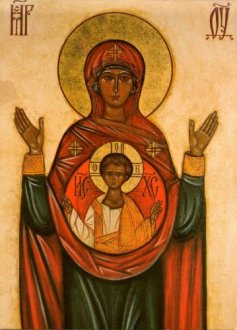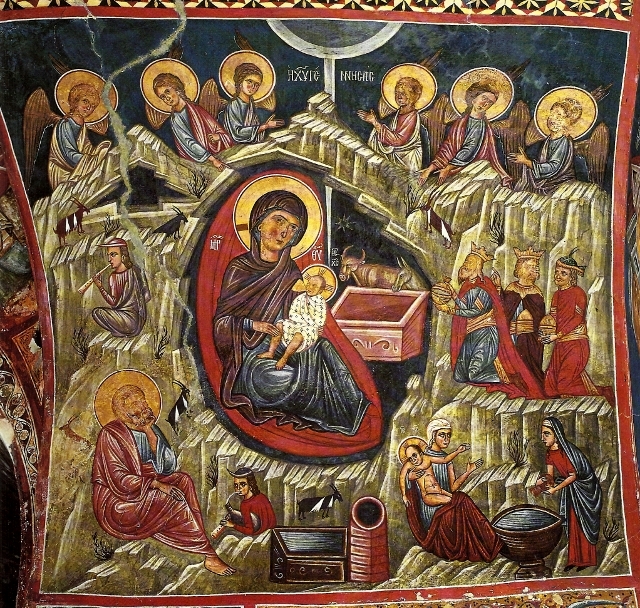Penal Substitution, Sola Fide and the New Docetism
by J. Matthan Brown
link here
Earlier this month I spoke about the cosmic importance of the Incarnation. Today I’d like to build upon this reflection. As I noted before, many Christians fail to see the Incarnation as the cosmic destiny or telos of Creation and, likewise, fail to see the work of Christ as including the sanctification, redemption, and renewal of the body and the physical/material world in general. For many, the work of Christ is narrowly construed. It was merely to satiate the wrath of God the Father so as to take away the punishment necessitated by sin (i.e., Penal Substitutionary Atonement). This popular view of the atonement is accompanied by another important doctrine classically referred to as Sola Fide or “salvation by faith alone.” It is this doctrine which teaches that belief—often understood as a sort of mental assent—in Jesus’ work on the cross is the sole means of our salvation.
I submit that both Penal Substitutionary Atonement (henceforth, PSA) and Sola Fide represent a form of “Neo-Docetism.” Unlike classical Docetism, which explicitly denied the Incarnation (that the Word actually became flesh), Neo-Docetism places such little significance on the Incarnation, and such heavy emphasis on Sola Fide (i.e., a mental assent to the propositional truth of PSA) it implicitly denies the Incarnation as being absolutely necessary for our salvation. Unfortunately, when we fail to view theology, and especially soteriology, through the lens of the Incarnation we run into major problems. Before we elaborate on this point, however, let us first take a closer look at Docetism as it was originally espoused.
Classical Docetism
Classical Docetism rejected the Incarnation outright and, in consequence, the Real Presence of Christ in the Eucharist (which was overwhelmingly accepted by all orthodox Christians for over a thousand years). Evidently, the original Docetist’s also rejected works of mercy as being crucial or necessary aspects of true faith in Christ. We learn this from the letters of St. Ignatius—who, consequentially, knew St. Peter and was installed as the Bishop of Antioch after St. Peter traveled to Rome . In his letter to the Smyrnaeans these three common threads of Docetism–the rejection of the Incarnation, the Eucharist, and works of mercy—are made very clear. St. Ignatius writes:
“But look at the men [i.e., the Docetist’s who deny the Incarnation] who have those perverted notions about the grace of Jesus Christ which has come down to us, and see how contrary to the mind of God they are. They have no care for love, no thought for the widow and orphan, none at all for the afflicted, the captive, the hungry or the thirsty. They even absent themselves from the Eucharist and the public prayers, because they will not admit that the Eucharist is the self-same body of our Savior Jesus Christ which suffered for our sins, and which the Father in His goodness afterwards raised up again. Consequently, since they reject God’s good gifts, they are doomed in their disputatiousness. They would have done better to learn charity, if they were ever to know any resurrection.”
Neo-Docetism
By minimizing the soteriological importance of the Incarnation, and, in fact, failing to make it the measure of their theologizing, the Neo-Docetist’s appear to follow the same pattern as their ancient predecessors. They reject the Real Presence of Christ in the Eucharist—and, thus, renounce the Sacramental Worldview held by the earliest Christians. In so doing, they fail to see how the love of neighbor (in tangible ways) is of soteriological importance. In point of fact, Sola Fide flatly rejects the idea that works of love and mercy are necessary for authentic faith and, thus, for salvation. For some the Neo-Docetist attitude has morphed into a full blown Gnosticism which views the human body as superfluous (e.g., we’re just “spirit-beings” waiting to escape the body), considers matters of social justice of secondary importance, and almost completely ignores the environment. Interestingly, these Neo-Docetist/Gnostic tendencies play a major roll in why Millennials seem to be drifting away from evangelicalism.
Incarnational Theology
In contrast, theology viewed through the lens of the Incarnation recognizes the broader implications and importance of, “the Word [who] became flesh and dwelt among us . . . full of grace and truth” (John 1:14). It recognizes Creation as being essentially good (Genesis 1:31) and as originally intended to be in full communion with God. It knows that nature is ultimately designed to direct us to its Creator. It thus maintains a Sacramental Worldview which acknowledges the Holy Spirit works in and through the Created world to sustain and renew it.
It further understands that sin has subjected all of Creation to futility because sin estranged the Creation from its Creator. Affirming with St. Paul that:
“The creation was subjected to futility, not willingly, but because of him who subjected it, in hope that the creation itself will be set free from its bondage to decay and obtain the freedom of the glory of the children of God. For we know that the whole creation has been groaning together in the pains of childbirth until now” (Romans 8:20-22).
Incarnational theology understands that, by taking on a real body, the Word of God, through whom and for whom all things where made (Colossians 1:16), sanctified the flesh and ushered in the renewal of Creation. As a real man Christ lived a life of perfect faith—obeying the will of the Father, healing the sick, giving sight to the blind, feeding the hungry, turning men away from their sin— admonishing us to do the same. Saying, “If you love me, you will keep my commandments” (John 14:15). Thus, showing us that to have a living faith is to be like Christ; to love the world as He loved it; to obey the will of the Father; to love our neighbors as we love ourselves. This is why St. James says:
“What good is it, my brothers, if someone says he has faith but does not have works? Can that faith save him? If a brother or sister is poorly clothed and lacking in daily food, and one of you says to them, ‘Go in peace, be warmed and filled,’ without giving them the things needed for the body, what good is that? So also faith by itself, if it does not have works, is dead” (James 2:14-17).”
Thus, salvation understood in light of the Incarnation is holistic–encompassing the whole of man. Jesus requires we give God everything we are. It is the first and greatest commandment: “You shall love the Lord your God with all your heart and with all your soul and with all your mind” (Matt. 22:36). Mental assent given to a set of propositions about Jesus (i.e. Sola Fide) is not enough; for, “even the demons believe–and shudder” (James 2:19). Faith certainly has a knowledge component but is not merely knowledge. Faith is tangible–it is played out through us as we live our lives in the corporeal world.
The Eucharist
In accordance with everything that has been said, Incarnational theology also recognizes the Real Presence of Christ in the Eucharist. It embraces the most controversial of Jesus’ teachings because it knows that He desires to draw us—in our entirety, body and soul–into full communion with Him; for this is the very point of the Incarnation. Thus, it understands what Jesus means when He emphatically states:
“Truly, truly, I say to you, unless you eat the flesh of the Son of Man and drink his blood, you have no life in you. Whoever feeds on my flesh and drinks my blood has eternal life, and I will raise him up on the last day. For my flesh is true food, and my blood is true drink. Whoever feeds on my flesh and drinks my blood abides in me, and I in him” (John 6:53-56).
The Word became flesh to give his flesh for us; to transform us; to redeem us; to restore us to what we truly are: men and woman made in the image and likeness of God. What amazing grace this is–that the God who formed the universe would unite Himself to it in order to preserve and keep it. This is the Gospel message–the kingdom of God is at hand! The Almighty God who created the heavens and the earth draws near! Intimately and, some might say, uncomfortably near. It is the most provocative message ever proclaimed by any teacher in all of history.






 Reply With Quote
Reply With Quote






Connect With Us